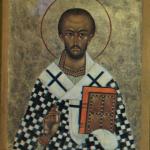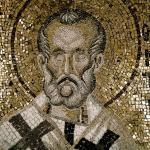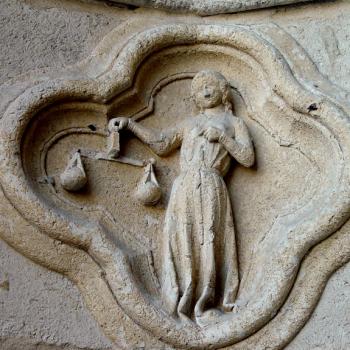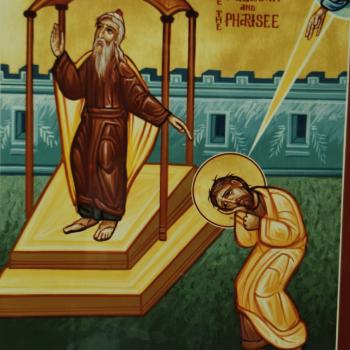
We are to look after and care for the living. Yes, we are to learn from the past, but we must not become so attached to it, for if we do, we become, as it were, one of the living dead. We must live in the present which, embracing those who are alive now and engage them instead of just focusing on the past and those who came before us. The past is behind us, and even if those in the past might be alive and with us in Christ, we must understand they exist in a new modality of life, one which has them connected to but still different from the way they were in their temporal life. Dealing with them based solely upon their former way of life, their former mode of existence, is to deny them the transcendent life and transformation which they have undergone. It truly is as if they are dead. We must, therefore, listen to the wisdom of Christ who said let the dead bury the dead, the wisdom which many of the desert fathers and mothers understood, as they were focused on living in the present, engaging the life which was before them instead of focusing themselves upon the dead past:
One who delighted in hard work saw a man carrying a corpse on a liter and said to him: ‘You are carrying the dead? Carry the living!’[1]
Not all actions, indeed, not all good works have the same value. Not all work is good. We can be said to be working for and carrying the dead when we focus so much on the past, and the rigid unchangeability of the past, trying to make the way things are as rigid or unchangeable by creating rules and regulations and enforcing them the extreme letter of the law. Scripture is quite clear, the way of the letter, the way of such rigorism and essentialism, is the way of death. The way of life is the way of the spirit. We must engage the present moment, the people who are around us, the living who are in need.
The more we focus on the past and the way things used to be, believing we can find some sort of golden age to recreate in the present, the more we lose sight of the living and the reality which lies before us. Yes, we can and should learn the lessons of those who came before us, but we must also learn to translate all that wisdom to meet our present context, to discern how their lessons apply to the living today. We must also discard all that has since been shown to be contaminated with spiritual rot or error. We carry the corpse of the dead with us and burden ourselves with it when we do not let the wisdom of the past organically develop to meet the needs of the present.
Every moment gives us the opportunity to engage the living, to embrace life in the spirit; we should embrace it today, promoting human dignity and love, working for the elevation of all, especially those who are in most need (the poor, the oppressed, the exile, et. al.). If we don’t, we will lose out on the bounties of life which God intended for us and those who we encounter throughout our lives. For, it must be made clear, every moment gives us new opportunities, new ways of engaging life, and when a given moment passes, its opportunities will also be gone, never to come again, which is why a desert elder pointed out: “If somebody loses gold or silver, he can find some in its stead; but he who misses an opportunity cannot find another.’[2]
We must, therefore, act in the present moment and embrace it. We must not confuse the expectations placed upon us as being some sort of moralism, though of course, we can establish practical moral norms to help us understand the kinds of considerations we must make in order to act so long as we understand we will have to engage those norms with a flexibility when dealing with real life considerations instead of theory alone. Again, it is important we do not make such moral norms into rigoristic rules which allow no compromise, no flexibility, for if we do that, we turn what could help us engage life into dead letters which send us off to the path of the dead. Our morality should be holistic, taking into consideration the fullness of the good instead of some partial reflection of it (which is what all moralism does). When this does not happen, we end up undercutting life itself, which, of course, we can see with the way many who proclaim themselves pro-life treat poor people in front of them with contempt, because they do not cherish life and the dignity of the human person and think their rules concerning birth is all that is expected for the promotion of life; is it any wonder why so many of them not only end up embracing cruelty, they demonstrate a bloodthirstiness which reflects their true disregard for life, showing how they have created and used a title which represents the antithesis of what they are in reality?
“The elders used to say of another brother that he never desisted from manual labour and that his prayer continually ascended to God. He was also exceedingly humble and of a very stable character.”[3] The way of life is the way of the spirit, and so, one which has us open to and constantly connected to God in all that we do. This is how we can pray without ceasing; prayer is about communion with God, sometimes engaging God with words, but often without them. All our actions should embrace our connection with God, centering ourselves upon God and the love which God is. This is how all we do can be said to be done in the spirit of prayer. Those who embrace the way of life will embrace the way of love, and in and through such love, they will love life, not just their life, but all life; not just human life, but all life. They will reveal their connection with God, their constant prayer, through our actions. On the other hand, many who pretend to care about life, carry with them not the living but the dead, even as their prayers become but dead words, as they have cut themselves from their heart and the way of love. Let us, therefore, let the dead bury the dead, as we look after and embrace the way of life, the way of love, which is the way of God.
[1] John Wortley, trans., The Anonymous Sayings Of The Desert Fathers: A Select Edition And Complete English Translation (Cambridge: Cambridge University Press, 2013), 219 [N335/16.14].
[2] John Wortley, trans., The Anonymous Sayings Of The Desert Fathers: A Select Edition And Complete English Translation,181 [N265/11,81].
[3] John Wortley, trans., The Anonymous Sayings Of The Desert Fathers: A Select Edition And Complete English Translation , 267 [N415].
Stay in touch! Like A Little Bit of Nothing on Facebook.
If you liked what you read, please consider sharing it with your friends and family!
N.B.: While I read comments to moderate them, I rarely respond to them. If I don’t respond to your comment directly, don’t assume I am unthankful for it. I appreciate it. But I want readers to feel free to ask questions, and hopefully, dialogue with each other. I have shared what I wanted to say, though some responses will get a brief reply by me, or, if I find it interesting and something I can engage fully, as the foundation for another post. I have had many posts inspired or improved upon thanks to my readers.













